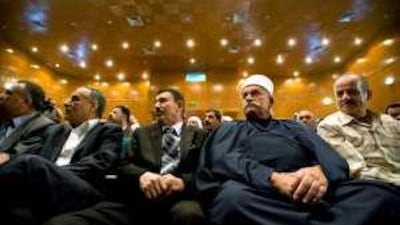DAMASCUS // If the first public meeting by Iraq's banned Baath Party in Syria's capital was intended as a show of strength, it was far from convincing.
The turnout was high enough: perhaps 500 people were in the audience at the Kafa Susa cultural centre, a stone's throw away from the site where Imad Mughnieh, a Hizbollah commander, was assassinated in an Israeli car bomb two years ago. The television cameras were there too, including a team from Al Rai, the satellite channel with a fondness for showing old footage of US soldiers being blown up by Iraqi militants.
There was also plenty of noise, notably clapping and cheers with every mention of the name of Iraq's late, deposed and subsequently executed dictator, Saddam Hussein. Ghazwan al Qubaisi, a senior Baath official and the right hand of Yunis al Ahmed, a faction leader wanted in Baghdad for alleged involvement in a series of atrocities, took to the podium and addressed the gathering, a departure from his usual elusive, low profile.
Dressed in a smart business suit and tie, he hailed Saddam as a martyr and linked the war being fought by Iraqi resistance groups to that being waged in Lebanon and the Palestinian territories. He mentioned Sykes-Picot, the nefarious agreement of 1916 in which the British and the French carved up the Middle East, sowing the seeds of many of the problems that plague the region today. But, beyond an at times accurate history lesson, the Iraq Baathists seemed to have little to offer for the future of their country. There was no programme of reform, no alternative, constructive vision for tomorrow, just talk of resistance and an atavistic harking back to the days when they ruled with an iron fist. A chant of "Saddam is a hero" rose up from the conference hall floor at one point, followed by a chant of "we are returning".
It is difficult to imagine either claim appealing to a majority of Iraqis. Even the politicians in Baghdad accused of being pro-Baathist - typically those in Ayad Allawi's successful Iraqiyya bloc - are often hardly that. Rather, they are realists who believe some political accommodation with the Baath is necessary if the nation's festering wounds are to ever heal. Mr Allawi himself is unlikely to ever be found chanting Saddam's name - the former dictator tried to have the young doctor murdered in his flat in Kingston upon Thames in south-west London in 1978, the would-be assassins injuring him severely and killing his wife.
True, Iraqis do sometimes look back on the time of Baath rule with a certain fondness for the stability it provided, yet there is no doubt that most would not want their old leader resurrected. They want security, prosperity and genuine independence from US occupation and Iranian machinations; they do not want a murderously oppressive, pariah state of the kind their old ruler built. There was more than a sliver of hypocrisy in the various Baathist speakers' denunciations of the current political process in Iraq. As many will quietly admit, they were instructed by Yunis al Ahmed to vote in the elections they supposedly despise, and to vote for Mr Allawi's Iraqiyya, the same Mr Allawi who spent years of his life trying to overthrow Saddam. They also concede the old days of the one-party state are unlikely to return.
Instead, the underlying message at last Thursday's Baathist conference in Damascus - behind the soaring rhetoric of resistance and the glorious past - was the message that the al Ahmed wing of the Baathists is seeking a rehabilitation to mainstream Iraqi politics, that it is open to a deal that could see an end to its support for the insurgents. Rather than hide in the shadows in Syria as it has for the past seven years, the party would now like to have seats in Baghdad's national parliament.
If a possible return to politics for the Baath Party was one of the oblique messages of such a public conference, so too was the importance of Syria as a regional player. Speaker after speaker praised the support Damascus has given them over the years, adding credence to what Syrian officials insist: if engaged with properly by the United States and Iraq, Syria can play a critical, positive role and have a stabilising influence. Damascus can support the resistance, or it can help push them towards political settlements and peace.
For all its sound and fury, the Baathist conference seemed less a show of strength than a show of division and of a lingering uncertainty. The Iraq Baathists are deeply divided; no one from one of its hard-line wings, led by Izzat Ibrahim al Douri, was at the meeting. One of the key speakers had, in a private conversation, admitted the Baath was now split into four groups, not even the generally accepted two.
More than a few of the speakers were, as their colleagues could be heard to mutter, irrelevant people with irrelevant thoughts that they liked to express at tedious length. "Look, it's another long, long empty speech," one of the Baathists in the audience complained as a elderly Syrian communist clung to the podium. The one thing the Iraqi Baathists of all stripes - including the Saddam venerators - could get some grim satisfaction out of is that, while themselves divided and weak, they are in some sense no more split, no weaker than the Iraqi government, or the Iraqi political classes in general.
The Baathists' greatest strength is their opponents' apparently irreconcilable divisions. With the Iraq election results being contested and with the various parties apparently happy to resort to fair means and foul to secure victory, the exiled Baathists can sit and wait for a political implosion that makes their dream of a return all the more likely. @Email:psands@thenational.ae

